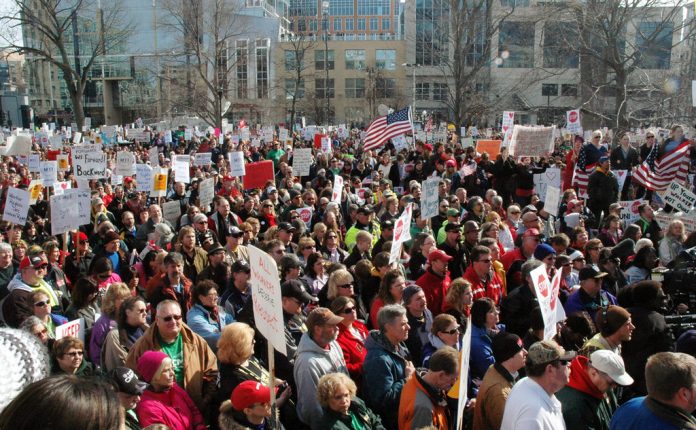Leftist money drove last week’s election wins, but with voters strongly divided, a further move to the left next year is by no means assured.
Last week’s election results represented some consolidation of leftist gains since 2018, once again affirming the power of public employee unions and the abortion lobby. What will happen later this year and in 2024, however, may be quite different.
Left-of-center candidates did well this time around. The farthest-left candidates won in important races in Chicago and Wisconsin, the latter considered a swing state in presidential elections. In Denver, Democrats took the two slots for a June 6 mayoral runoff election, with the top Republican candidate finishing a distant fourth.
Off-year elections reflect the clout of big-money institutions such as public employee unions, advocacy organizations, and large corporations, with the first-named being the most powerful of all in municipal elections.
Accordingly, Chicagoans elected Brandon Johnson, a candidate to the left of incumbent Lori Lightfoot, a radical progressive whose failures in crime control and education caused her to miss the runoff election held April 4. Johnson defeated Paul Vallas, a lifelong Democrat and former CEO of the Chicago Public Schools and other public school systems.
Johnson, a Cook County commissioner and former teacher and union organizer, received powerful support from the Chicago Teachers Union (CTU) and other progressive organizations. Johnson “raised some $10.1 million through March 31, and 91% came from unions, more than half from the CTU, according to the Illinois Policy Institute,” The Wall Street Journal reports.
Johnson has been highly critical of the police, saying in a 2020 radio interview defunding is “an actual, real political goal.” Vallas, by contrast, had called for the addition of hundreds of police officers and efforts to restore morale. Johnson promised to add or promote 200 officers. In addition, Johnson strongly opposes education reform, whereas Vallas supports it.
Fox News analyst Gianno Caldwell characterized Johnson’s election as “horrific” and said the incoming mayor “stands to be worse than” Lightfoot, speaking on the network’s show “Your World.” “[This] to me was the signing of thousands of death certificates of people who don’t have to die because of the policies which he’s advocated for,” Caldwell said. Caldwell’s teenage brother was murdered in Chicago last year.
Just north of Chicago, a state court race received national attention—and a record amount of campaign contributions.
Wisconsin has a strict abortion ban (no abortions except to save a prospective mother’s life), as an 1849 law was reinstated by the U.S. Supreme Court’s Dodd decision last year. The Wisconsin Supreme Court had a one-vote conservative majority, and a conservative is vacating the seat contested last week.
Candidate Janet Protasiewicz, a Milwaukee County judge, campaigned on a pledge to strike down the state’s (duly enacted) abortion law. Protasiewicz also supported a referendum that would make it easier to increase or deny bail, thus eroding the difference with her opponent on crime prevention.
Protasiewicz won by 10 percentage points against a GOP candidate whom Democrats spent $1 million in the primary to nominate over a more formidable contender. The two candidates for the court seat spent more than $45 million—almost three times the previous record nationwide—much of which came from out of state. The result shows the political power of the abortion issue and, critically, the campaign contribution advantage it provides for candidates in favor of abortion. It also confirms the power of the public employee unions, who were solidly behind Protasiewicz.
Meanwhile, the Republican candidate won a hotly contested election in the Milwaukee suburbs, giving the GOP a supermajority in the state senate. The Republicans are just two seats shy of a supermajority in the state assembly.
In Denver, the most-progressive candidates fell short in the races for mayor and city council seats, with the Denver magazine 5280 saying, “it seems like many Denver voters had a hard time bending far-left.”
The leftist press (apologies for the redundancy) are spinning the recent elections as a big win for the Democratic Party and a good omen for the latter’s prospects in the 2024 elections. The substantial Republican majorities in the Wisconsin legislature indicate that such triumphalism may be premature, as does the lack of traction for far-leftists in Denver.
Overall, the week’s elections generally continued recent trends. Government employee unions and abortion advocacy groups remain powerful in blue cities and in statewide elections in the swing states, but there is much public support for more conservative social and economic policies. The nation is still strongly divided, and next year’s elections are likely to reflect that, with a further move to the left by no means assured.
Originally published by American Greatness. Republished with permission.
For more Budget & Tax News.











